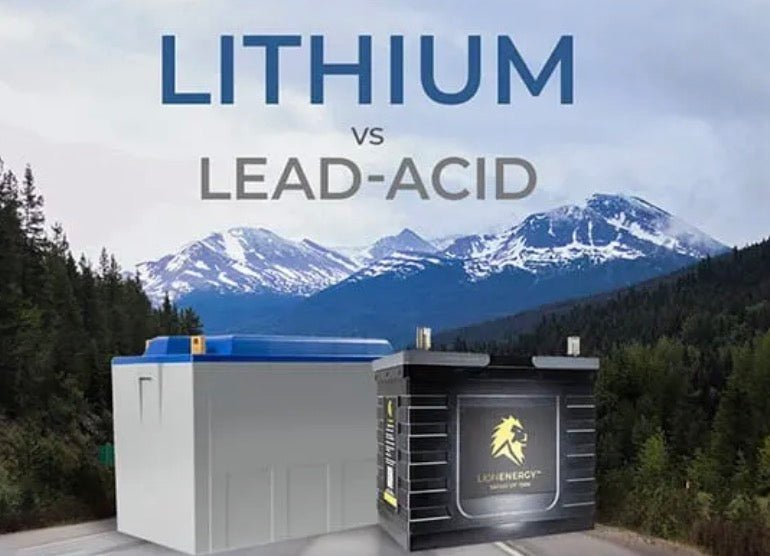
Why Lithium Batteries and Which one is the Best?
Eco PoweritShare
All batteries are not the same. There's the traditional lead acid battery and there are superior lithium battery (yah, we're a little biased but we'll share the facts with you so you can see why).
Lead Acid Batteries |
Lithium Batteries |
| Lead acid batteries have been around a long time and they come in various shapes and sizes including "golf cart" and AGM to Deep Cycle and more. Here's some things to consider with any lead acid battery: | Lithium batteries are a newer, more advanced technology than lead acid. They come in different shapes and sizes too. For RV use, they commonly are Lithium Iron Phosphate and provide several advantages over lead acid batteries. Let's use the same topics as shown on the left under lead acid batteries as a comparison: |
| Usable Energy. The energy in the battery is expressed in terms of Amp hours (Ah). Lead acid batteries often state its Ah as one thing but what is actually usable is another. For example, it may say it has 100Ah but lead acid batteries typically only use approximately 50% of that so you are really getting 50Ah of usable energy out of the battery. And if you drop much below that depth of discharge, you stand to damage or lose the use of the battery altogether. And that means replacing it. | Useable Energy. Lithium can use all of the stated Ah so if the battery says it has 100Ah, it means you can use 100Ah and do that over and over again. Most lithium batteries also have a Battery Management System (BMS) that regulates and protects the battery from things like over charging and over discharging. In practical terms, this means you'll get about 2X the camp time using a lithium battery vs a lead acid battery. And that allows you to enjoy more time on your adventure and with family and friends. |
| Length of Use. The amount of times you use or discharge the battery and then recharge it for use again is called Life Cycles. Lead Acid batteries, using the 50% discharge capacity mentioned above, will have approximately 250-350 life cycles before they need to be replaced. And that's assuming you take good care of it. | Length of Use. As we discussed, the average Life Cycle of a typical lead acid battery is about 300 cycles. A lithium battery is more than 10X that or 3,500 if you completely use the energy in it each time and then recharge it again. It can last over 5,000 times if you don't always completely discharge it each time you use it. That means if you use all the energy in the lithium and recharge it — every single day — it will last almost 10 years and still have about 80% of its capacity left. Try that with lead acid batteries—not! |
| Maintenance. Taking care of a lead acid battery is important to extend its life. Some require fluid to be added, cleaning the terminal posts from chemicals, and have some type of trickle charging on the battery so they don't go dead after a few months of not using it. | Maintenance. With the chemistry makeup of a lithium battery, there is virtually no maintenance needed. You can disconnect the wires to the terminals during the off season and simply leave the battery in your RV. When you're ready to use it again, reconnect and you're ready to go. You may want to top it off with a charge and then go. |
| Weight. Because you have to handle a lead acid battery from time to time, weight becomes an issue. Lead acid batteries range from 45 lbs or so to nearly 120 lbs or more for some deep cycle batteries. That's a lot of weight... and strain on the back. | Weight. Lithium batteries are much, much lighter than lead acid batteries, especially deep cycle lead acid ones. The Lion Safari UT™ 1300 lithium battery weighs only 23 lbs. Other lithium batteries are just over 30 lbs. So, you can move them around easily and remember, they have 2X the useable energy than lead acid too. |
| Value. This includes the initial purchase price and the cost of maintenance and replacement. Lead acid batteries purchase prices range from just under $100 to over $300 depending on type and quality. Then you need to figure in maintenance and replacement costs as most lead acid batteries, even if maintained properly, last 3-5 years at most. That's why their warranties are usually only for that timeframe and are also prorated so you don't get as much use or value. Most people don't remember to do the proper maintenance, so they have to replace the batteries every year, over and over again. | Value. When you take into account the initial cost, no maintenance, longer use and more usable energy, lighter weight and longer warranties, lithium is a much better value. It's more upfront but worth every penny. |
